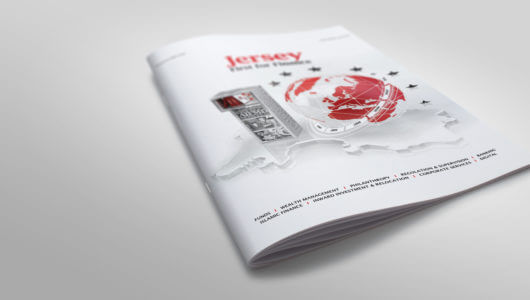Our unshakable, safe and admirably steady nature has been one of the pillars that our largest industry is built on.
This has held us in good stead. After the credit crisis hit in 2008, the financial services industry globally faced a time of unprecedented change and Jersey had increasing appeal, as a secure, reputable environment to do business in a chaotic world.
Then, just as the finance industry was beginning to comprehend and adjust to the scale and impact of the new, ever-changing turbulent world of global regulation, the second wave of the modern digital revolution rapidly accelerated. Suddenly, there were as many opportunities as there were challenges, as well as a whole new category of ‘unknown’ market factors.
To give some context for this, it is worth remembering that between 2002 and 2010 mobile phone usage went from 19% of the world population to 68% and internet users from 11% of the world population up to 27%.
Adjusting to new pressures, while embracing new innovations, has been the complicated task of the financial services industry for the last 10 years. Also for a jurisdiction that specialises in financial services, it has at times been uncomfortable. How do we continue to provide stability and certainty, while also becoming more adaptable and accelerating innovation?
Jersey’s natural strengths, such as political stability, a sound economy and a skilled workforce have all helped us to remain competitive. We are fortunate to have strong infrastructure, in particular in the area of regulation. The work done by the Jersey Financial Services Commission (JFSC) gives us the foundation we need to secure our existing industry against change and also provide a platform for us to innovate from in areas such as regtech. We also have excellent technical, physical infrastructure in Jersey, such as; an Island-wide fibre network, three high quality 4G networks and robust data centres facilities. All of this is very appealing, as more businesses want to know their data is held in a very safe and well-regulated location. This is nothing to do with tax planning – it is about compliance, governance and security. A number of financial organisations have concerns about hosting with providers like Microsoft and Amazon, since President Trump announced that he will take copies of data hosted by them in the cloud. Data, in some ways, has become more valuable than money.
Our human infrastructure, so to speak, is also strong, not just within finance but also within the digital sector. We have incredibly gifted and qualified people working in the technology space, alongside their experienced colleagues in the finance industry, to create solutions that are being rolled out globally at the highest level in some of the world’s leading organisations.
In many ways, Jersey is becoming the ideal testbed for fintech solutions, where our small, contained but well-equipped environment allows us to try new things and develop them for larger markets. This means ensuring support in these areas, by growing local skills and resources, working closely with local stakeholders, like Digital Jersey and also maintaining and improving links to major global technology companies like Microsoft and HPE. It also means supporting business intelligence and business change.
This may include, for example, working with local finance firms on projects that use AI machine learning to make customer interactions more ‘humanlike’ and improve the data outputs from those interactions, so that businesses can make better decisions about products and services. We are also helping businesses to develop new, better, more secure ways to store and manage data safely, with advances, elastic solutions that self-heal, eliminating the need for costly support. Of course cybersecurity is also a key priority for the finance sector – and for us here in Jersey – alongside constant adaptation and management for regulatory changes such as GDPR.
As everyone in the finance sector and beyond is very aware, GDPR introduces new requirements and the right to data portability, which means that finance firms in particular need better audit trails, better website functionality and better data consent processes. While GDPR has created challenges, it has also forced us all to look long and hard at how we handle data and to consider how all of our technology works together, as a whole. This can only be a good thing, as a platform for future innovation.
Five years ago, we said that today, the finance industry would be unrecognisable from what it was. While that has not proven to be exactly true – and many traditional services still make up the bulk of the offering – it is fair to say that the energy of the sector has shifted.
There is an acceptance from the finance sector that technology is now the most important investment they can make. The conservative style that we used to see from financial institutions was understandable, as they were worried about their reputation and battling constantly to meet ever-changing regulatory standards to regain trust after the credit crisis.
Now, the focus has shifted away from the needs of the giant corporations and back to the needs of the customer. Technology may have been disruptive but it has also improved efficiencies, improved customer service and given people more options. An estimated 69% of the population now use mobile phones, ironically, mostly not to make phone calls. Even just a few years ago finance firms would debate if they needed an app for their clients to engage with them. Now most of them know they do. The debate now is how to add in AI functionality.
All of this innovation is exciting, challenging and at times, a little scary. This next year is going to be absolutely pivotal for Jersey’s finance industry and specifically its fintech sector. With market pressures mounting, driven by yet more regulation and the proximity of the UK’s uncertainty over Brexit, our best chance and only chance to continue to thrive, is to continue to innovate. We need to adopt new technology and we need to adopt fast. I also believe that we are ready to. We have the right infrastructure, the right people, the right regulation, the right political environment and the right mind set.
Rob Leader, Group Managing Director, C5 Alliance.
As Managing Director across the C5 Alliance Group, Rob Leader’s integrated approach to business strategy combines the best technical solutions with good business practices. With over 40 years’ experience, Rob has led C5 to grow to 200 people and made a continued commitment to invest in financial technologies at the cutting edge.

